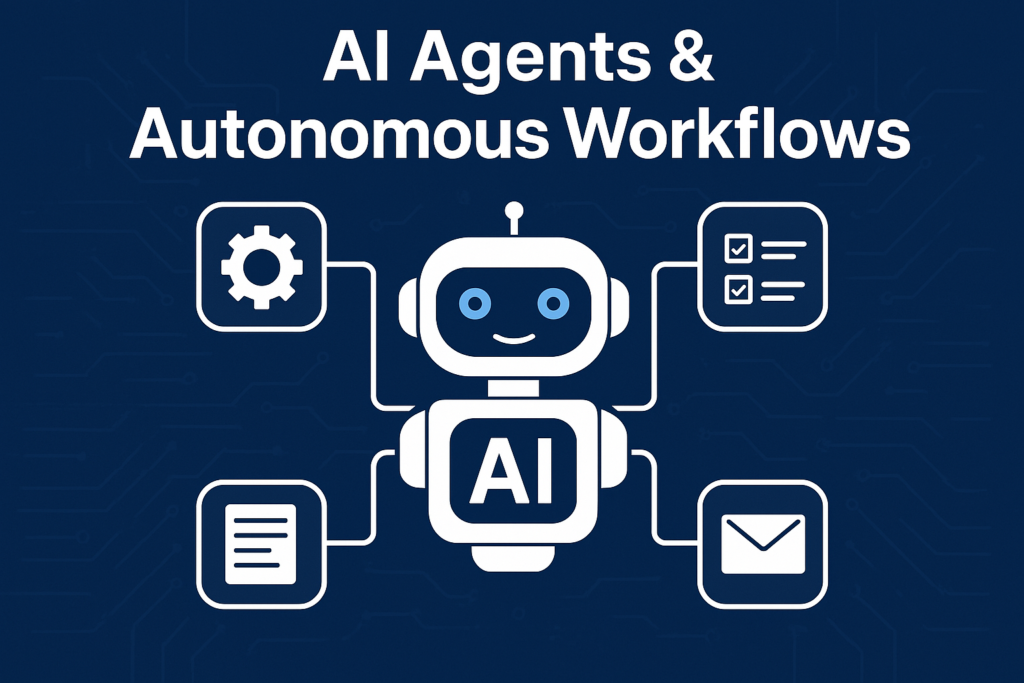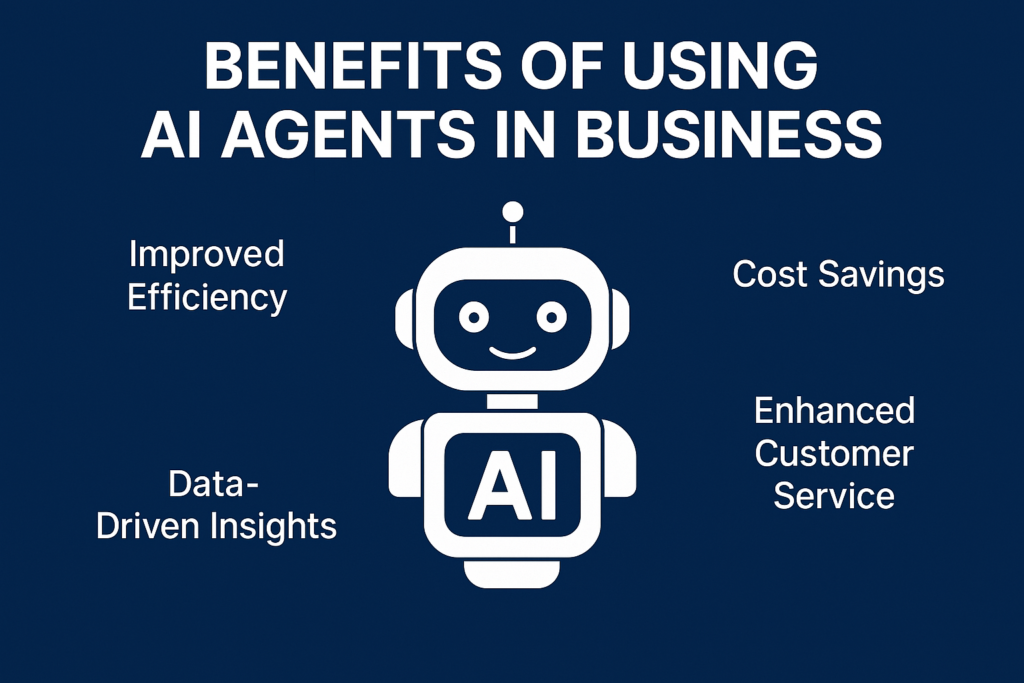In recent years, artificial intelligence (AI) has shifted from mere hype to a transformative force across nearly every industry. But in 2025, the next evolution is here: AI Agents and Autonomous Workflows. This new wave of intelligent automation is not just about doing things faster—it’s about creating systems that think, plan, adapt, and execute tasks with minimal human intervention.
In this article, we’ll explore what AI agents are, why they’re gaining so much traction, and how tools like AutoGPT, ChatGPT Agents, and Devin (by Cognition Labs) are redefining productivity and workflows in both consumer and enterprise landscapes.

What Are AI Agents?
AI agents are autonomous software entities that can understand instructions, make decisions, and take actions to achieve specific goals. Unlike traditional bots or scripts that follow pre-set instructions, AI agents are goal-driven and context-aware. They use large language models (LLMs), reasoning algorithms, APIs, and memory tools to perform complex tasks independently.
Key Capabilities of AI Agents:
- Goal-based execution: You provide an end goal, not just a series of steps.
- Autonomous decision-making: They plan, adapt, and troubleshoot during execution.
- Tool usage: They can use APIs, browse the web, read documents, or operate software interfaces.
- Learning and memory: Some agents can remember past interactions and improve over time.
The Rise of Autonomous Workflows
Autonomous workflows are AI-powered systems that execute full business or technical processes without constant human intervention. They are composed of multiple steps and often require integration between different tools, apps, and data sources.
For example:
- In marketing: An AI agent can create a campaign brief, generate ad copy, schedule social posts, and monitor performance.
- In software development: An AI like Devin can write code, run it, debug errors, and commit it to a repository.
- In customer support: ChatGPT agents can handle tier-1 and tier-2 queries, access databases, escalate issues, and summarize logs.
Why AI Agents Are So Hot Right Now
1. Limitations of Traditional Automation
Workflow automation tools like Zapier or UiPath are powerful but require structured rules and manual configuration. They don’t adapt well to change or uncertainty. AI agents, on the other hand, bring cognitive flexibility to automation.
2. Advancements in LLMs
Tools like GPT-4o and Claude 3 can understand nuanced language, follow multi-step instructions, and reason through ambiguity—making them perfect for autonomous agents.
3. Real-world Applications Are Here
Unlike earlier AI models, today’s AI agents are already being deployed in real-world scenarios:
- AutoGPT: Builds and runs multi-step plans by chaining LLMs together.
- ChatGPT Agents: Built into ChatGPT Pro, can automate tasks like scheduling meetings, summarizing files, or controlling external tools.
- Devin: A software engineer AI agent that writes, tests, and debugs code from scratch.
4. Enterprise Adoption
Companies like Microsoft, Google, and Amazon are embedding AI agents into their ecosystems. Salesforce’s Einstein GPT and Microsoft Copilot are good examples of AI workflows improving productivity at scale.
Deep Dive into Top AI Agents
1. AutoGPT
Developed by Significant Gravitas, AutoGPT is an experimental open-source application that uses GPT-4 to autonomously achieve goals. You give it a high-level objective, and it breaks it down into tasks, executes them in sequence, and modifies its approach if needed.
Use Cases:
- Market research
- Competitor analysis
- Business planning
2. ChatGPT Agents (OpenAI)
Released with GPT-4 Turbo, these agents can perform specific roles (e.g., coding assistant, data analyst, content creator) and can be customized with tools and APIs.
Use Cases:
- Internal team assistants
- Data summarization
- Lead generation & CRM workflows
3. Devin (by Cognition Labs)
Arguably the most advanced AI agent for developers. Devin can:
- Take a project brief
- Write production-ready code
- Run it in a real environment
- Fix bugs and commit changes
Devin is not just a tool; it’s like having a junior developer on your team 24/7.
Benefits of Using AI Agents in Business

1. Cost Efficiency
Reduces the need for manual labor and repetitive tasks.
2. Scalability
You can scale operations without increasing headcount.
3. Speed and Productivity
Faster execution of multi-step tasks without delays or bottlenecks.
4. Consistency
Agents don’t get tired, distracted, or bored. They maintain consistent quality.
5. 24/7 Availability
AI agents work round the clock with no downtime.
Challenges and Risks
While the promise of AI agents is massive, there are also important challenges:
1. Hallucinations and Errors
AI may make confident but incorrect decisions. Guardrails and monitoring are essential.
2. Security and Access Control
Giving agents access to sensitive data or systems requires robust permissions and encryption.
3. Ethical and Regulatory Issues
Autonomous agents in finance, healthcare, or law need to comply with regulations and ethical guidelines.
4. User Trust and Adoption
Many users still prefer a human in the loop, especially for high-stakes decisions.
The Future of AI Agents
The next few years will see AI agents:
- Becoming collaborative teammates: Agents will be able to work alongside humans on shared projects.
- Getting multi-modal abilities: Combining text, voice, image, and video understanding.
- Operating across apps seamlessly: Unified agents managing Gmail, Slack, Notion, Salesforce, and more.
- Personalization: Tailored agents that know your preferences, habits, and business style.
In short, AI agents are set to evolve into digital co-workers that understand context, adapt dynamically, and deliver measurable impact.
Final Thoughts
The era of AI Agents and Autonomous Workflows is not just a tech trend—it’s a fundamental shift in how we approach work, productivity, and innovation. Businesses that embrace this evolution early will enjoy a competitive advantage in speed, efficiency, and adaptability.
As tools like AutoGPT, ChatGPT Agents, and Devin become more powerful and accessible, the line between human work and machine automation will continue to blur. It’s no longer about replacing jobs; it’s about redefining roles and supercharging human capabilities.
Now is the perfect time to explore how AI agents can be integrated into your workflows—not just to keep up with the future, but to help build it.

